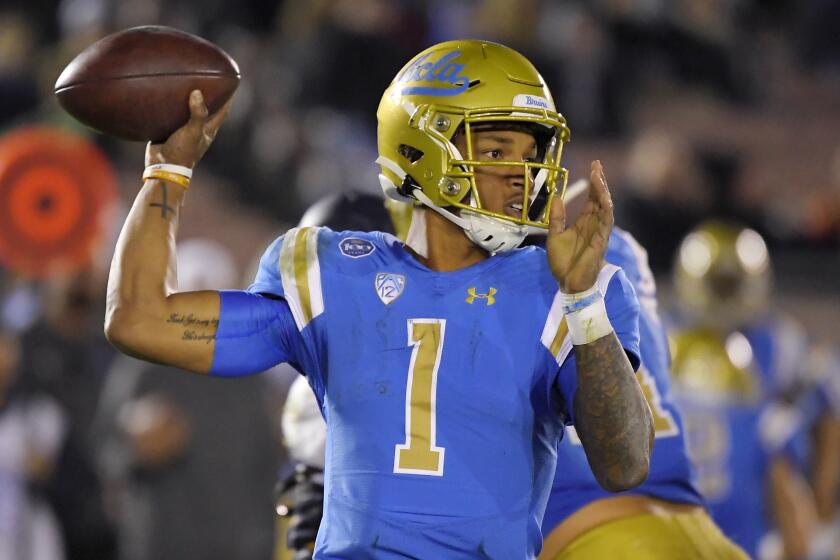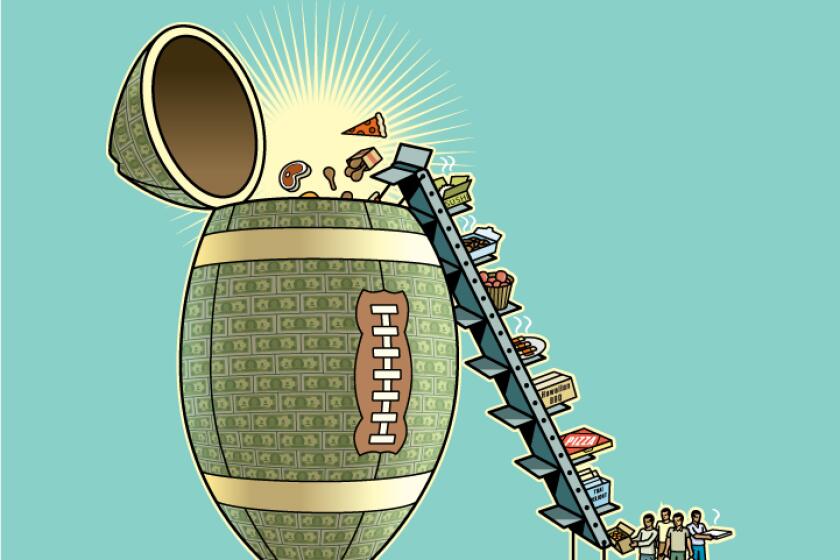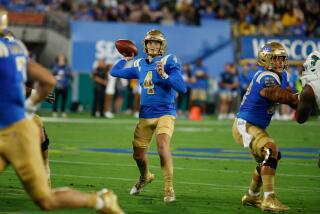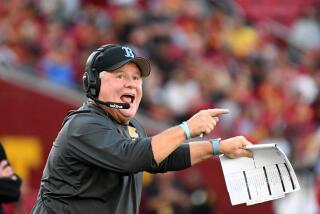Experience could help UCLA avoid past early season stumbles
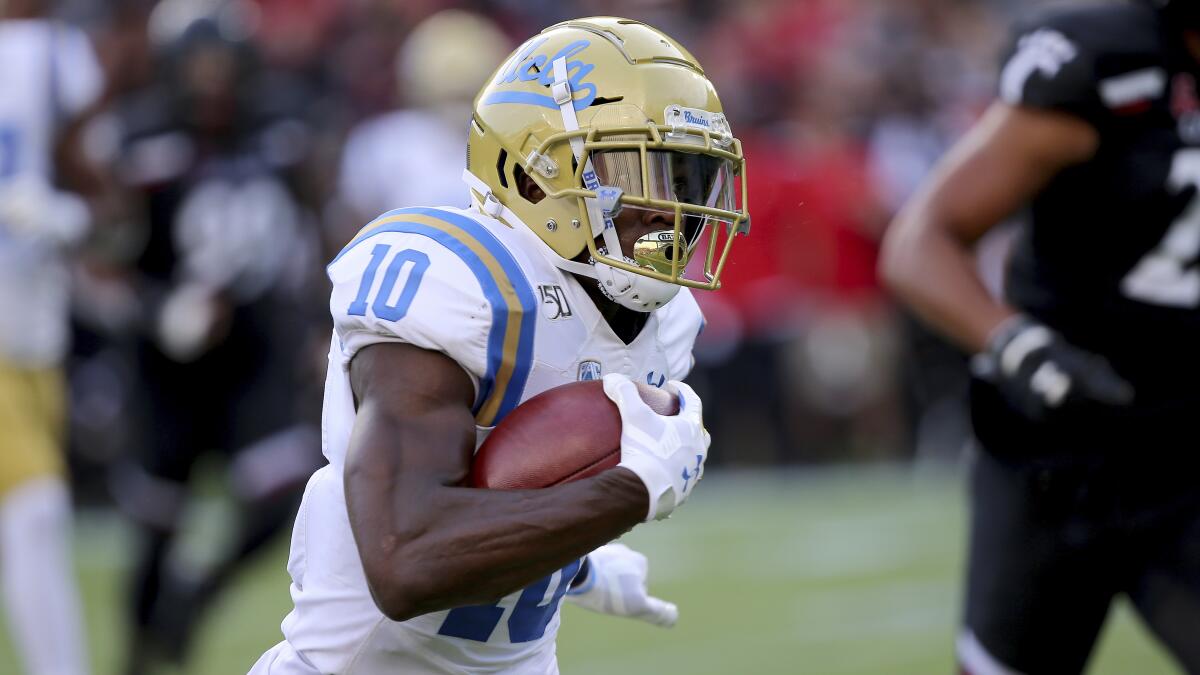
The only certainty about UCLA’s 2020 football season is that the Bruins won’t lose any more nonconference games under Chip Kelly. They will open the season Saturday at Colorado as part of a seven-game, conference-only schedule resulting from the COVID-19 pandemic.
Another slow start, however, is a possibility under a coach who has gone 0-6 in games outside of the Pac-12 Conference, including 0-4 against Group of Five conference opponents, and said he doesn’t see any theme that needs addressing.
“Nope,” Kelly said Monday during a conference call with reporters when asked about fixing his team’s early season stumbles.
Kelly said he did not alter anything structurally in training camp to help his team sharpen its focus after losing to Cincinnati, Oklahoma and Fresno State in 2018 as part of an 0-5 start before losing to Cincinnati, San Diego State and Oklahoma to begin 2019.
“Our slow starts had nothing to do with non-sharpened focus,” Kelly said.
The coach was asked to what they were related.
“We played pretty good teams,” Kelly responded.
UCLA quarterback Dorian Thompson-Robinson and the rest of the Bruins enter game week focused on what’s ahead: Saturday’s season opener vs. Colorado.
And how did you play in those games?
“We didn’t play well enough to win,” Kelly said.
The depth chart that UCLA released shortly before the coach spoke provided perhaps the team’s best hope for less humble beginnings in 2020. The Bruins listed one graduate transfer, five seniors and nine juniors as projected starters for the game against the Buffaloes. More significant, the two-deep chart revealed 22 players who have been with the team since Kelly’s arrival, sparking hopes that the water-the-bamboo metaphor favored by the coach could finally come into play.
That would involve the Bruins showing considerable growth after two seasons of negligible results despite all the nurturing. In a departure from seasons past, Kelly has not referenced his team’s youth once during interviews. Reporters who want to know how many freshmen and sophomores are on the roster must conduct their own count.
“We have guys who have played a lot of football,” Kelly said, “so that experience is something they can lean on.”
That veteran savvy should be especially beneficial at quarterback, where junior Dorian Thompson-Robinson won’t experience many surprises after starting 18 games in his first two seasons. Kelly said his quarterback’s understanding of route concepts and offensive-line protections were among the details he had mastered heading into Year 3.
Another concept that has come into focus is holding on to the ball. After struggling with turnovers as a freshman and a sophomore, Thompson-Robinson said he had not lost a fumble or had a pass intercepted in training camp.
State and county health officials cited rising community spread of COVID-19 as the key factor in their decision not to allow family at UCLA and USC home games.
Almost everywhere he looks on the offense, Thompson-Robinson sees a familiar face. The top three receivers are returning starters, and redshirt senior running back Demetric Felton Jr. was a top playmaker last season.
“Everybody knows exactly what they’re doing on exactly every play,” Thompson-Robinson said, “so I expect to get off to a fast start, I expect everybody to move off the ball a lot faster and get to their spots a lot faster and I think that will turn everything around.”
UCLA’s defense also is dotted with returning starters everywhere except at linebacker, where Bo Calvert and Leni Toailoa will move into more prominent roles after contributing heavily as backups in previous seasons. The team listed true freshman Damian Sellers and redshirt junior Mitchell Agude as the starting outside linebackers as part of a 3-4 alignment that could shift to 4-2-5 come Saturday.
“The guys that we have are obviously a more mature group as far as age-wise than we’ve had in years past,” Calvert said, “so guys are able to play with a lot more confidence and they can see things faster.”
Starting nod
Felton said he felt honored to be designated as the starting running back, beating out graduate transfer Brittain Brown, after coming to UCLA as a wide receiver and overcoming doubts about his durability to handle the transition.
“It means a lot,” Felton said, “because I didn’t come here to play running back.”
As the centerpiece of a department facing a growing deficit, UCLA football has gorged itself on food spending that has no rival nationwide.
In addition to Felton and Brown, Kelly said running backs Keegan Jones and Kazmeir Allen would get carries in the opener.
Depth charge?
Kelly said he expected every player listed on the two-deep chart — and even some who were not, including linebacker Choe Bryant-Strother — to play against Colorado except the backup quarterbacks, barring injury.
“We’re going to rotate our running backs. We’re going to rotate our receivers. We’re going to rotate our tight ends. We’re going to rotate our offensive line, and the same thing defensively,” Kelly said.
In something of a surprise, sophomore nickelback Carl Jones, who made five tackles against USC last season and was considered an emerging talent, was not listed on the two-deep. Also absent was converted quarterback Colson Yankoff, who joined a loaded receiving corps after making the position switch during training camp.
Kelly said he had not decided on a starting kicker or punter, with Nicholas Barr-Mira and Luke Akers fighting for both jobs.
More to Read
Go beyond the scoreboard
Get the latest on L.A.'s teams in the daily Sports Report newsletter.
You may occasionally receive promotional content from the Los Angeles Times.

